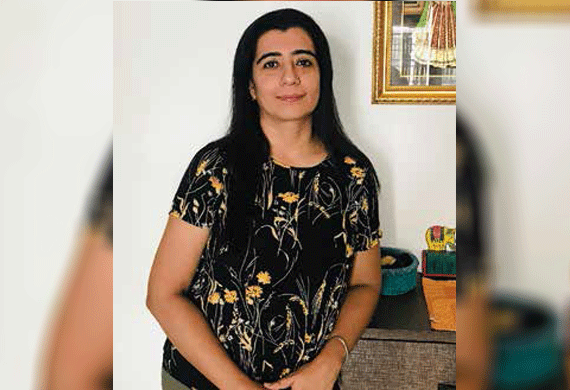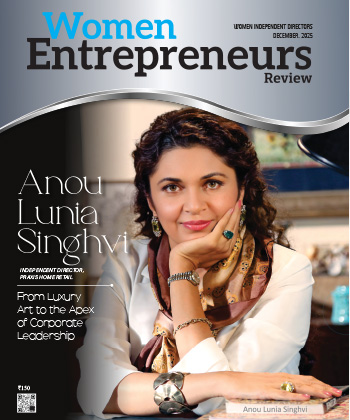Leaders

Akanksha Bector: A Social Entrepreneur Bridging The Gap Between Producers And Consumers
Akanksha Bector
Director & CEO, Lyngum Innovations
Successful entrepreneurial ventures are often based on ideas that strive to plug a gap in the market. And most often, entrepreneurs stumble upon these gaps either from personal experience or looking at market. For Akanksha Bector, Director and CEO, it was her longstanding experience working with different multinational manufacturing and service companies in the finance and accounts department that gave her the opportunity to understand every aspect of a business. This exposure inspired her to establish Lyngum Innovations. An e-commerce platform, lyngum.com provides a platform for sellers from all over India to sell their healthy, environment friendly and nonmass produced goods online.
Akanksha specializes in financial planning and analysis, marketing, internal controls and management reporting. She has a bachelors degree from Symbiosis International University and PG degree from Institute of Chartered Accountants of India. After completing her MBA from SP Jain School of Global Management, Mumbai, she has been pursuing PhD in finance to understand the ground realities of micro finance in rural areas.
She started her journey as a social impact entrepreneur 3 years ago, with a ‘for-profit’ enterprise that works to support rural livelihoods, sustainable products through leveraging technology.
In an interview with Women Entrepreneur Magazine, Akanksha, shares her insights on the company’s value proposition, the purpose of establishing her business and market overview.
Can you give a brief overview of the company? How have you established in the market.
After the onset of the pandemic, there is a visible shift in the mindset of Indian consumers and producers. A number of people are choosing to start their own small ventures, a lot of home grown brands are developing, which use local, sustainable or natural raw materials for their products. There are consolidations of farmers and artisans producing healthy and sustainable products. On one hand, there is a growth of multiple small enterprises in the country that are looking for alternate sources of selling their products. On the other hand, there are people constantly looking to buy healthy and environment friendly products at affordable rates. In short, long term wellness has become a concern for everyone.
To create this bridge, we created an e-commerce platform lyngum.com where we bring both the parties under a single roof. Our platform includes small to large producers like farmers, artisans, women entrepreneurs and so on, all working on socially relevant products. We partner with people that have pioneered and scaled models of natural, organic and sustainable products.
Lyngum.com offers unique opportunities for businesses with social impact. We are all about new cutting edge disruptive technologies that make our mission measurable, effective and tangible. One of the primary objectives of our initiative is to transform each farmer, artisan and skilled person into an entrepreneur.
What are key business challenges that are associated with your role and how do you tackle them and overcome them?
Since our platform is at an initial stage, every angle of the business has to be given thoughtful attention. I take care of business development and all aspects of operations. I also support the technical and marketing team who built this platform for an easy user experience or to automate the processes.
Speaking about challenges, I would call them ‘learning experience'. First and foremost is managing people, which are crucial resources. A strong product is based on excellent people, a good team and your ability to manage their expectations. In addition, technology is evolving at such a fast pace that understanding the changes, embracing technology, implementing it for all business processes is always a task. Getting the right people to implement technology, especially the ones that are motivated enough to understand your goals and objectives is a task. Like all young organisations, we also had operational issues in the beginning. Lyngum addressed all these with the help of a highly skilled team and robust in house technology. Today, we have a vendor base of 1200 farmers and 5,000 artisans connected with us and steadily onboarding them on the platform.
"Our mission is to drive transformative social impact by applying talent and technology in partnership with the most innovative and socially aligned entrepreneurs"
Please elaborate on your business strategies and tools that you leverage to ensure the success of the organization.
Our aim is making sure that the product is not damaging the environment in any way or its actually improving the life of the people who are involved in the supply chain. This is what we call as shared value.
We try to keep a cost differentiation for our products. Our objective is to provide high value and quality for the products with minimum cost. If you look around properly, there's a lot of hidden potential in our Indian products.
Next, we are taking care of women's empowerment by including more women sellers. Our focus is on small and medium enterprises as they will not have enough money to advertise and to make themselves known. But there must be a method for offering a marketing platform to people who are working hard on creating items, using their creativity, skills, and local raw materials, but we may not have enough professional skills. That’s where lyngum.com steps in. We do not believe in extravagant marketing spending. Rather, we invest in quality assurance and personal assistance for our sellers and customers.
What advice would you provide to women and the younger generation that want to start their own businesses?
My advice would be to first gain rich experience in the early stages of your career, to maintain a learning attitude, and to constantly look for opportunities to apply what you have learned. There is nothing wrong with doing a conventional job for a couple of years, to understand your industry, and to take calculated risks in your early years. If you decide to venture into entrepreneurship, you should do so with some prior research of the industry and a clear thinking to set focused and timed goals. Conviction in your idea with persistence is the basis of any worthwhile output.
Akanksha Bector, Director & CEO, Lyngum Innovations
Akanksha specializes in financial planning and analysis, marketing, internal controls & management reporting. She has a bachelors degree from Symbiosis International University and PG degree from Institute of Chartered Accountants of India. After completing her MBA from SP Jain School of Global Management, Mumbai, she has been pursuing PhD in finance to understand the ground realities of micro finance in rural areas.
Most Viewed
- 1 Women's Health Startup HerMD Closing Doors Amid Industry Challenges
- 2 5 Famous Women in Indian Armed Forces
- 3 Saudi Women No longer Require Male Permission for Clothing Choices, says Prince MbS
- 4 Kolkata Medtech Startup Innovodigm Raises Rs 5.5 Crore Seed Funding Led by IAN Group
- 5 Yamunanagar's Kashish Kalra Honoured after Securing 111th Rank in UPSC Civil Services Exam
- 6 Madurai Appoints Its First Woman Corporation Head
- 7 IAS Vijayalakshmi Bidari Appointed as the new Nagpur Divisional Commissioner
- 8 American Entrepreneur Lucy Guo Overtakes T Swift to become Youngest Female Billionaire
- 9 ICC Women's World Cup 2025 Trophy Showcased at Indore's Holkar Stadium
- 10 Aparna Saxena's Beauty Venture AntiNorm Launches in India
- 11 Vidya Nataraj Co-Founded BlueStone Jewellery & Lifestyle files IPO
- 12 5 Women Freedom Fighters of India
- 13 Dr. G Krishnapriya appointed as CEO for Trichy
- 14 M3M & Sirona Partner to Introduce Menstrual Hygiene Vending Machines in 15 Locations
- 15 Punjab Govt launches SHE Cohort 3.0 Supporting Tech-led Women Startups
- 16 Indian origin Lawyer, Sweena Pannu appointed as the US New Superior Court Judge
- 17 The Aurora Tech Award recognizes 4 Indian Women-led Startups
- 18 Kerala's Republic Day parade featured an all-female tableau
- 19 Manisha Kabbur Becomes Karnataka's First Woman International Karate Coach
- 20 Director K. S. Ravikumar's Daughter Maalica Ravikumar Launches Life Coaching Company 'Evergrowth Academy' for Women
- 21 Leezu's Raises Pre-Seed Funding to Accelerate Growth in Sexual Wellness Industry
- 22 Sattu: Super-easy summer drink for PCOS gut healing
- 23 Swathi Nelabhatla creates Sitha App, India's First Women-Exclusive Gig Platform
- 24 7 Timeless Female Kathak Dancers & their Iconic Legacies
- 25 Meet 7 Iconic Women Architects of Modern India & their Most Impactful Work
- 26 This Woman-led Insuretech Startup is Helping Bridge the Education Financing Gap in India
- 27 Women Leaders Share Lessons Learnt from India Women's WC Win
- 28 5 Enterprising Women Founders Powering Singapore's Tech & Innovation Landscape
- 29 4 Women. 4 Stories. One Vision for Smarter, Stronger Healthcare
- 30 Global Gender Gap Narrows to 68.8%, But Full Equality 123 Years Away: WEF Report 2025
- 31 Changemakers: 7 Women Entrepreneurs Taking the Make in India Movement Forward
- 32 Meet Lucy Guo, The Youngest Self-Made Female Billionaire Disrupting Tech
- 33 How Women are Driving India's Festive Online Shopping Surge






